Litoria havina is a species of frog in the subfamily Pelodryadinae. It is found in New Guinea.

The Appalachianmountain chorus frog, formerly known as just the mountain chorus frog, is a species of frog in the family Hylidae. The species is endemic to the United States. The natural habitats of P. brachyphona are temperate forests, rivers, intermittent rivers, swamps, freshwater marshes, intermittent freshwater marshes, freshwater springs, ponds, open excavations, and canals and ditches. It is threatened by habitat loss.

Dyscophus antongilii, the Madagascar tomato frog, is a species of frog in the family Microhylidae.

Glyphoglossus molossus is a species of frog in the family Microhylidae. Its common names include blunt-headed burrowing frog and balloon frog.

The Natal dwarf puddle frog is a species of frog in the family Phrynobatrachidae. It is found in Angola, Benin, Botswana, Burundi, Cameroon, Central African Republic, Republic of the Congo, Democratic Republic of the Congo, Ivory Coast, Eswatini, Eritrea, Ethiopia, Gambia, Ghana, Guinea, Guinea-Bissau, Kenya, Liberia, Malawi, Mali, Mozambique, Namibia, Nigeria, Rwanda, Senegal, Sierra Leone, South Africa, Sudan, Tanzania, Togo, Uganda, Zambia, Zimbabwe, and possibly Burkina Faso, Chad, Lesotho, and Mauritania.
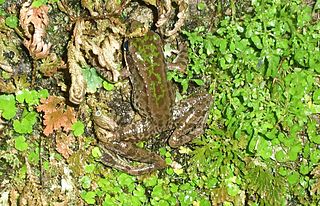
Odorrana swinhoana is a species of frog in the family Ranidae. It is endemic to Taiwan and widely distributed in hilly areas below 2,000 m (6,600 ft). It is named for Robert Swinhoe, a British naturalist and diplomat. Its common names include Swinhoe's brown frog, Bangkimtsing frog, brown-backed odorous frog, Taiwan odorous frog, and Taiwan sucker frog.
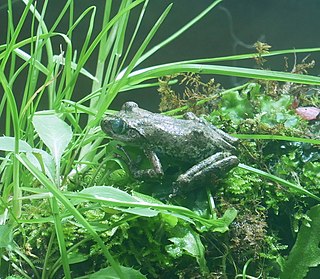
The Kajika frog or Buerger's frog is a species of frog in the family Rhacophoridae. It is endemic to Japan where it can be found on Honshu, Kyushu, and Shikoku islands. It is locally threatened by habitat loss caused by dam building and construction of concrete riverbanks.

Buergeria is a genus of frogs in the family Rhacophoridae, and the sole genus of subfamily Buergeriinae. They are the sister taxon for all the other rhacophorids. This position is firmly supported by the available evidence.

Buergeria robusta is a species of frog in the family Rhacophoridae. It is sympatric with Buergeria japonica but is much larger in size.
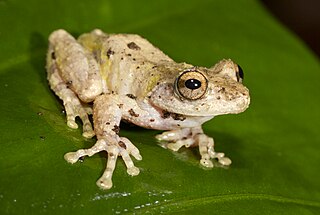
Kurixalus eiffingeri is a species of frog in the family Rhacophoridae. It is found in Taiwan and on the Yaeyama Islands of Japan. Its natural habitats are subtropical or tropical moist lowland forests and subtropical or tropical moist montane forests. It is threatened by habitat loss.

Kurixalus idiootocus is a small species of frog in the family Rhacophoridae. It is endemic to Taiwan and is commonly known as the temple tree frog. Its natural habitats are subtropical or tropical moist shrubland, seasonally wet or flooded lowland grassland, freshwater marshes, intermittent freshwater marshes and irrigated land. It is listed as being of "Least Concern" by the IUCN although there may be some destruction of its habitat.
Kurixalus odontotarsus is a species of frog in the family Rhacophoridae. It is found in southern China, Vietnam, Laos, and possibly Myanmar. Its natural habitats are subtropical or tropical moist lowland forests, subtropical or tropical moist montane forests, subtropical or tropical moist shrubland, intermittent freshwater marshes, heavily degraded former forest, and canals and ditches. It is threatened by habitat loss.

Polypedates leucomystax is a species in the shrub frog family Rhacophoridae. It is known under numerous common names, including common tree frog, four-lined tree frog, golden tree frog or striped tree frog. Many past authors have united it with the common Indian tree frog in P. maculatus, but today they are generally considered distinct species. In its native range, it is also called "white-lipped tree frog", but this name is otherwise applied to a species of true tree frogs.

The Chinese flying frog or Chinese gliding frog is a species of tree frog in the family Rhacophoridae found in China, Laos, Burma, and Vietnam. It is also known as Blanford's whipping frog, large treefrog, and Denny's whipping frog.

Zhangixalus moltrechti is a species of frog in the family Rhacophoridae. It is endemic to Taiwan, where it has a wide distribution in hilly areas. Common names Moltrecht's green treefrog, Moltrecht's treefrog, Taiwan treefrog, and Nantou flying frog have been coined for it.
The Malayan flying frog is a species of frog in the moss frog family (Rhacophoridae). It is found in Indonesia, Malaysia, and Thailand.
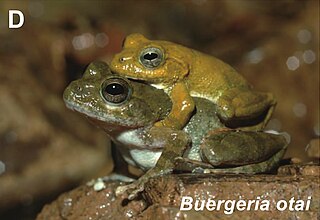
Buergeria otai is a species of frogs in the family Rhacophoridae. It is endemic to Taiwan and found in the eastern and southern parts of the island. Buergeria japonica, with whom Buergeria otai was confused before described as a distinct species in 2017, occurs in northwestern Taiwan. The two species have only a narrow contact zone and can be distinguished based on genetic markers, calls, and morphology.
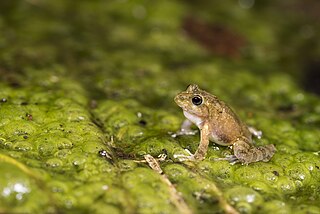
Buergeria choui is a species of frog in the family Rhacophoridae. Prior to its description in 2020, it was confused with Buergeria japonica. It is found in northwestern Taiwan and in the southern part of the Ryukyu Archipelago, Japan, specifically on the Yaeyama Islands. Common name Yaeyama Kajika frog has been proposed for it. The specific name choui honors Wen-Hao Chou from the National Museum of Natural Science (Taiwan), the first person to pay attention to the variation within the former Buergeria japonica.
















